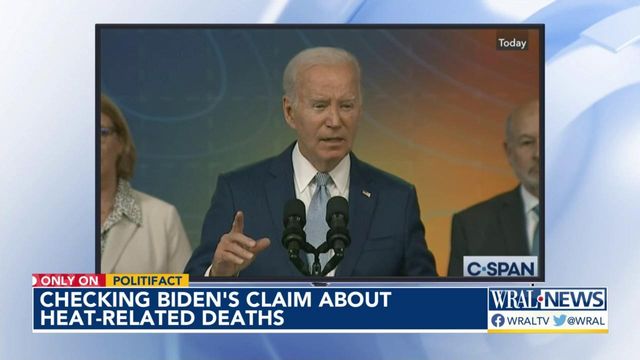Fact check: Biden says heat kills more Americans than floods, hurricanes and tornadoes 'combined'
As much of the country was baking in unusually intense heat, President Joe Biden held a White House event to highlight extreme heat’s dangers and to announce efforts by several of his cabinet agencies to aid states and cities grappling with sizzling temperatures.
"The No. 1 weather-related killer is heat. Six hundred people die annually from its effects, more than from floods, hurricanes and tornadoes in America combined, Biden said July 27.
Looking strictly at National Weather Service statistics, Biden’s assertion is inaccurate. However, a range of scientists told PolitiFact that more accurate assessments — those that capture "excess deaths" above typical levels, rather than heat being listed as a cause of death on death certificates — make Biden’s statement correct.
Using excess death measurements, there’s reason to believe Biden’s comments significantly underplay the scale of heat deaths in the U.S., scientists said.
"Heat is a major killer and a force multiplier of chronic disease," said Pope Moseley, a research professor at Arizona State University’s College of Health Solutions.
What government statistics show
Scientists told PolitiFact that to have been fully accurate, Biden should have noted variations in the estimates of heat-related deaths per year, depending on both the method of calculation and differences from year to year.
For instance, the National Weather Service has an extensive data set for the number of deaths caused by both heat and by a variety of weather-related disasters.
The weather service statistics show that the number of deaths from floods, hurricanes and tornadoes collectively averaged 194 from 1986 to 2022. The average number for heat deaths was smaller, at about 137 per year over the past two decades. Nevertheless, heat deaths exceeded the combination of deaths from floods, hurricanes and tornadoes in 11 of the past 36 years.
However, another federal agency, the Centers for Disease Control and Prevention, has data that shows higher levels of deaths from heat. These are the figures the White House pointed us to.
A CDC webpage on "Extreme Heat" says, "Heat-related deaths and illnesses are preventable. Despite this fact, more than 600 people in the United States are killed by extreme heat every year."
A 2010 CDC study reported that from 1999 to 2010, 8,081 people died in the United States from heat-related deaths. That’s 600 to 700 Americans per year. About three-quarters of those deaths were primarily because of heat, and in the rest, heat was a contributing factor, the CDC said.
Another CDC study from 2020 found that from 2004 to 2018, the average number of annual heat-related deaths was 702.
Are the numbers higher?
Biden’s figure of 600 deaths was probably an understatement because the CDC figures on heat deaths are almost certainly low, several scientists told PolitiFact.
To register in the CDC database as a heat-related death, a death certificate must specifically cite heat as a cause. But scientists say that many people die of heat-related deaths without heat being officially noted this way.
"It is often difficult to specifically ascribe a particular death to extreme heat," said Sameed Khatana, an assistant professor of medicine at the University of Pennsylvania. That’s especially true, he said, when comparing heat deaths with those from other types of weather disasters, which tend to be more localized and easier to assess.
Excessive heat can serve as a stressor that can turn a person’s pre-existing health problems fatal in ways a death certificate may not capture.
"The numbers of heart attacks, strokes, and respiratory failure deaths often skyrocket during a major heat event, and they are most often excluded from heat-related deaths," said Laurence S. Kalkstein, an emeritus professor of climatology at the University of Miami who is now president of Applied Climatologists in Marco Island, Florida.
Kristie L. Ebi, a professor at the University of Washington’s Center for Health and the Global Environment, said she estimates that about half of excess deaths during heat waves are from cardiovascular causes.
Scientists can skirt this statistical problem by undertaking "excess death" studies.
Excess death studies
In this type of study, researchers look at the long-term pattern for the number of deaths in a particular area and compare it with the number of deaths that occur during periods of unusually high heat. The difference between those measurements is known as excess deaths.
A study Khatana co-authored used this method to estimate that there were 13,000 to 20,000 heat deaths between 2008 and 2017, or 1,300 to 2,000 a year — two to three times what Biden indicated.
Kalkstein said his estimates are similar, putting the annual average at about 1,500, although the number is "highly variable from year to year."
Other research has put the number even higher. A 2020 study of 297 U.S. counties that accounted for about 62% of the national population found an average of 5,608 deaths were attributable to heat annually from 1997 to 2006.
The phenomenon of excess deaths during heat waves has been echoed in studies of Europe as well.
PolitiFact ruling

Biden said, "The No. 1 weather-related killer is heat. Six hundred people die annually from its effects, more than from floods, hurricanes and tornadoes in America combined."
Data from the National Weather Service doesn’t support the claim about heat outpacing deaths from the three other weather events combined, but CDC data does back it up.
Scientists say both sets of federal data significantly undercount the number of heat deaths because they are drawn from death certificates, which often overlook heat. Studies of excess deaths during U.S. heat waves suggest that the real number of heat-related deaths could be two to 10 times higher than what Biden cited.
We rate the statement Mostly True.












